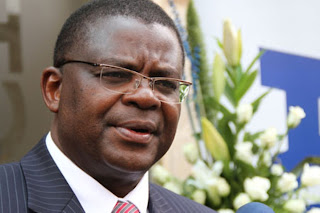Treasury is one of the critical organs in any government. Besides being responsible for managing governments finances, it also formulate ways of collecting revenue and invest in short term surpluses and arrange lenders to cover short-term cash shortages. This blog aims at looking at successes of various Finance Ministers who were mandated to run this critical sector.
1.James Gichuru 1963-1969
He was Kenya's first Finance Minister under Mzee Jomo Kenyatta's government. He undertook expansionary fiscal and monetary policy.
 |
James Gichuru.
|
2. Mwai Kibaki(1969-1981)He was the second Kenya's Finance Minister. He served during both the time of Mzee Jomo Kenyatta and Daniel Moi. He was the longest serving Finance Minister. As president our economy grew significantly and there was little foreign aid. He moved Income Finance Bill 1973 where couples married at the commencement of the year earned a tax relief
 |
Mwai Kibaki.
|
3.Arthur Magugu(1981-1988)
He was the third Finance Minister. He served under Moi regime. He was Land Economics graduate. He used to read budget on July instead of June. He ordered the removal of Kenyatta's portraits from government offices.
 |
Arthur Magugu.
|
4.George saitoti(1988-1992)
He was fourth Minister for Finance. He served between 1988 to 1992. Though he was associated with Goldenberg scandal, he wooed foreign donors and investors a move that raised revenue to finance Kenya's budget.
 |
| George Saitoti. |
5.Musalia Mudavadi(1993-1997)
He is the fifth Finance Minister. He served between 1993 to 1997 under Moi regime. He liberalized economy by removing trade barriers. He made changes in CBK by placing term limits to governors. He removed price controls on trading commodities. He further removed foreign exchange controls making easy for import and export thus improving our balance of payment position.
 |
Musalia Mudavadi.
|
6. Simeon Nyachae(1998-1999)
He was the sixth Finance Minister after Musalia. He served under Moi. He discouraged corruption that was so persistent under Moi regime.
 |
Simeon Nyachae
|
7. Chris Okemo(1999-2001)
He served as the 7th Finance Minister after Nyachae. He took over when IMF had suspended loan facilities due to corruption. Even though there was no economic growth, he ensured that there was discipline among government ministries, hence they lived within their budgets.
 |
Chris Okemo
|
8.Chris Obure(2001-2002)
He was the 8th Finance Minister after Chris Okemo. He served under Moi when opposition was so united to oust KANU from government. He proposed effective resource allocation as a remedy to the challenges the country was facing.
 |
Chris Obure.
|
9. David Mwiraria(2003-2006)
He is the 9th Finance Minister. He served under Kibaki regime. He left a record of fiscal discipline and enabled Central Bank to regain its image in managing banking sector and hence made private sector to grow. It was during his time that we experienced surplus budget(2003/2004)
10. Francis Masakhalia(2006-2006)He was the 10th Finance Minister after Mwiraria. He served under Kibaki regime. It is unclear which policies he put in place.
 |
Francis Masakhalia
|
11. Amos Kimunya(2006-2008)
He is the 11th Finance Minister and he served under Kibaki regime. He maintained stable economic growth
 |
Amos Kimunya
|
12. John Michuki(2008-2009)He served as the 12th Finance Minister under Kibaki regime. He is remembered for being strict and hence maintaining investors confidence.
 |
John Michuki
|
13. Uhuru Kenyatta (2009-2012)He was the 13th Finance Minister of Kenya. He served under Kibaki regime. He came up with a policy that ensured the government contained the growth in public debt to a sustainable level to ensure private sector isn't crowded out.
 |
President Uhuru Kenyatta when he was Finance Minister
|
14. Robinson Githae(2012-2013)He is the 14th Finance Minister. He worked under Grand-Coalition government. He devoted much allocation towards energy sector.
 |
Robinson Githae
|
15. Henry Rotich (2013-2019)
He was the 15th Finance Minister and the first under Uhuruto regime. He increased public spending and hence public debt increased due to borrowing. Under Rotich, infrastructure was the greatest beneficiary among other sectors.
 |
Henry Rotich.
|
16. Ukur YataniHe is the 16th Finance Minister currently CS under the new constitution. He has tried to maintain public spending while managing public debt. However, due to Jubilee's ambitious plans, he has sourced for external debt under world Bank and IMF.
 |
| Ukur Yatani, current Finance CS |


















Comments
Post a Comment